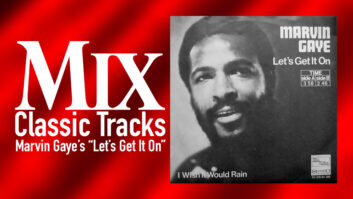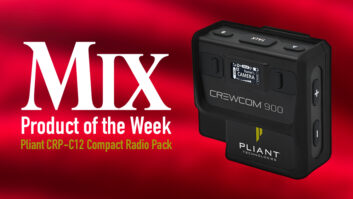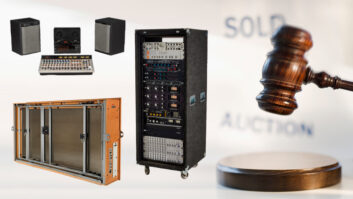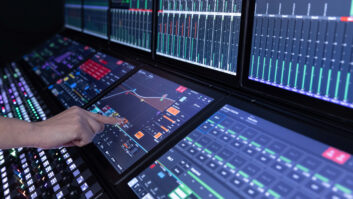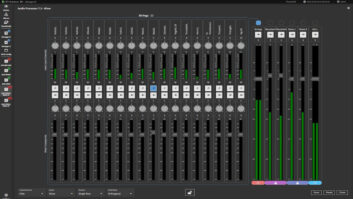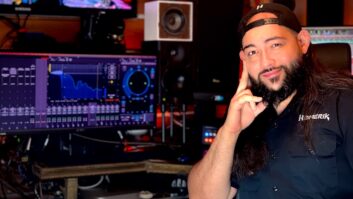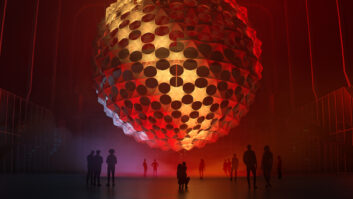
New York, NY (April 30, 2021)—When COVID-19 shut down the world last spring, multi-Platinum rapper Meek Mill and Anthony Cruz, his engineer since 2013, were in the Bahamas realizing that the way they recorded together wouldn’t be the same going forward. Once the pair returned to a closed-up United States, it didn’t take long before the artist couldn’t deal with how the pandemic-induced lockdown was preventing him from emptying his thoughts into songs. Cruz recalls, “It got to a point where he was like, ‘I understand things are real, but I really need to get going.’ My back was to the wall and I had to find a solution.”
Once Cruz found it, they never looked back—Meek Mill and Cruz were able to record, mix and release the four-track Quarantine Pack EP in late November 2020, closing out an eventful year. Cruz recapped it all for Pro Sound News in this interview, lightly edited for length and clarity.
Q: After getting back from the Bahamas as the pandemic was ramping up, how did you and Meek adjust to the lockdown?
We’d been in-person vibing for seven years by that time, so it was a very dramatic change of workflow. It was just too dangerous at the time to jump out and do the regular in-person workflow, so when I was digging into potential solutions and testing different options, I was like, “How are we going to be able to work?” I ended up finding an amazing solution for the time.
Q: That involved a home studio?
Before the pandemic, we were able to store equipment at Meek’s house. He had never really used the space because he likes to leave the house to go to work, so we typically would lock-in the studios. We’d already built out a proper home studio for him—we have Genelec 1234A speakers with 18-inch subs on either side, a Universal Audio Apollo interface, and his mic chain is a BAE 1073 mic preamp that goes into a Tube-Tech CL 1B. He uses a Slate VMS microphone, which is basically a mic that mimics all the classic mics—it’s like a tool belt where, depending on who you’re recording or what the vibe of the song is, you can change the texture to match some of the vintage classic mics that we’re used to that cost tens of thousands of dollars. It does a really good job of matching the tone, and it just became our go-to over time.
Q: How were you able to record Meek remotely?
People are using Zoom to control the computer and then they use one of these audio streaming companies that basically allow you to get a clean signal on your side as the engineer and you control the workflow of who you’re recording. It’s interesting because it allowed me to really see what the opportunities were in this space, because it was never a necessity before to have to be ready for remote recording. You have to use Zoom and you have to use a plug-in and stream it, too—it’s not efficient—and it’s basically like he had a ghost engineer. Meek would be like, “Oh my god! Cruz isn’t even in the room and he’s recording me.”

Q: Did you observe a difference in the creative process between you and Meek working remotely as opposed to when you two have been together?
What you notice when you’re working remotely compared to in-person is that it’s all about trying to maintain the energy as if you’re still in the room. I had to find multiple ways of making the process efficient enough where it didn’t interrupt his workflow. We kept the same level of speed, but there were so many things I had to do on my end—I had to have an account that had all the beats that I was gathering from producers, copy a link, send it over to his computer while I’m streaming the audio. Then, after the session, I had to find a program that could back up all the files so I could send them to myself without it taking up too much time because maybe the internet wasn’t strong enough. We would be on a FaceTime call during the session, so we could still have that interaction and I could hear what the energy was in the room. That was a big thing. We had a separate iPad [for FaceTime] that was the communication between me and him live on the spot. Besides the streaming link, I was hearing him on the mic, but when he jumped off the mic, I had to mute the signal so we didn’t get feedback, any blasts of music or whatever. I needed a source of communication, so that was FaceTime.
It’s actually amazing the things we were able to get done. The Quarantine Pack EP he put out in late November is exactly what it’s titled—we did it all remotely. I would hit [producer] Nick Papz and bounce ideas. We got nothing but time on our hands, so it’s like your mind’s going crazy—“we’ll make this a bigger record!” Being in tune with the mixer live, you guys are both able to collaborate on a mix. They can be like, “Yo, let me try something different here,” and they’re able to control your computer and do their thing, and then you’re like, “Oh, hold on—let me try something.” So it’s this live collaboration. It still feels like we could potentially be in the same room. We were able to do some incredible things and still impact with the music.
Also By Keith Nelson: Recording Roddy Ricch for Round Two
Q: I saw you guys got back to the studio in November. How was it being back in person?
It was interesting. It was still nerve-wracking for me, because my biggest thing was, I’m in the house with my baby girl and I got wifey, and I just felt like it was something I’ve never had to deal with before. It was a genuine fear of not about me, but how I would affect somebody else if something were to happen on this trip. It got to a point where we took all the precautions we needed in terms of constant testing and making sure everybody was safe and masked and everything. The first time, Meek actually ended up in New York and we were able to link up in person. That’s in my backyard, so that was a no-brainer. We had a couple of sessions there, and then the next sessions in person were actually back in the Bahamas again. Once the vaccine came out, I felt a little more confident once I was in that groove.
Q: Do you feel that you’ve gotten better as an engineer over the last year?
I think it’s really helped me creatively. I’ve really tapped in on another level on a creative side. Before, I would put somewhat of a limit on myself. Now I’m trying more things and putting myself out there more creatively. I think that’s the biggest thing— that it’s helped me a lot that way. Once I actually got our workflow together, it actually inspired fellow industry people to come up with really cool innovative technologies of their own, and I’m working with [Jay-Z’s engineer Young] Guru on solutions as well. We’re coming up with how we can innovate this space and make it more efficient.
